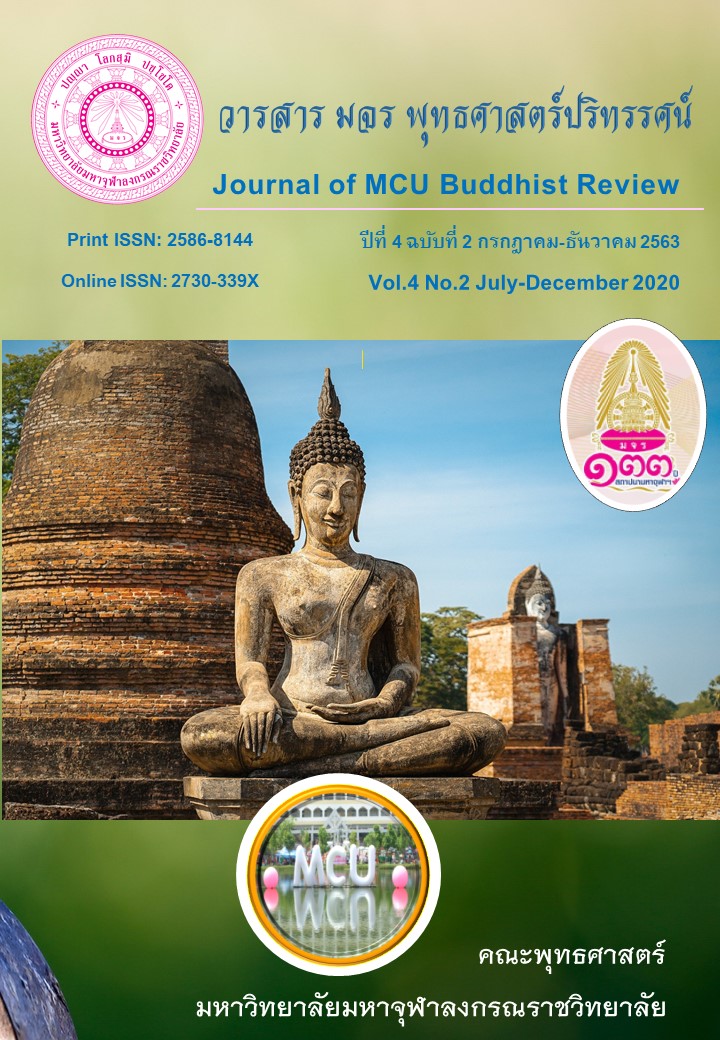ชาวพุทธควรวางท่าทีต่อเรื่องอจินไตยอย่างไร?
Main Article Content
บทคัดย่อ
อจินไตย 4 อย่าง ได้แก่ พุทธวิสัย วิสัยของพระพุทธเจ้า ฌานวิสัย วิสัยของผู้ได้ฌาน กัมมวิบาก การให้ผลของกรรม และโลกจินตา ความคิดเรื่องโลก พระพุทธศาสนาจัดว่าเป็นเรื่องที่ไม่ควรคิด เพราะไม่สามารถหาคำตอบได้ด้วยการครุ่นคิด เมื่อมีการกล่าวถึงเรื่องนี้ขึ้นมา จึงทำให้ชาวพุทธจำนวนไม่น้อยไม่กล้าวิพากษ์วิจารณ์และไม่ศึกษาหาคำตอบ หรือบางครั้งเมื่อได้รับคำถามที่ตนเองไม่สามารถตอบได้ก็มักอ้างว่าเป็นเรื่องอจินไตย ทั้ง ๆ ที่เรื่องนั้นไม่ใช่เรื่องอจินไตย
ตามหลักของพระพุทธศาสนานั้น เรื่องอจินไตยไม่ใช่สิ่งที่แตะต้องหรือทำความเข้าใจมิได้เลย เพียงแต่จะต้องศึกษาและวางท่าทีที่ถูกต้อง เป็นความจริงที่ว่าการหาคำตอบจากเรื่องทั้ง 4 อย่างนี้ จะอาศัยเพียงการคิดเดาเอาเองไม่ได้ เพราะคิดเท่าไรก็ไม่ได้คำตอบ แต่หาคำตอบได้ด้วยการศึกษาและลงมือปฏิบัติอย่างถูกต้อง กล่าวคือ การจะทราบพุทธวิสัยได้ทุกอย่างโดยละเอียดก็มีหนทางเดียวคือต้องบำเพ็ญบารมีเพื่อตรัสรู้เป็นพระพุทธเจ้า การจะทราบวิสัยของผู้ได้ฌานก็ต้องปฏิบัติกรรมฐานจนบรรลุฌานขั้นต่าง ๆ การจะทราบกัมมวิบากได้ก็ต้องศึกษาเรื่องหลักกรรมและการให้ผลของกรรม และการจะทราบโลกจินตาก็จะต้องศึกษาคำสอนที่เกี่ยวกับจักรวาลวิทยา เช่น อัคคัญญสูตร จึงจะทราบได้ อย่างไรก็ตาม ในทางพระพุทธศาสนาไม่ได้มุ่งเน้นให้ค้นหาคำตอบเรื่องอจินไตยเป็นสำคัญ แต่เน้นให้ปฏิบัติตามหลักมรรคมีองค์ 8 เพื่อความหลุดพ้นจากกิเกส เพราะเมื่อปฏิบัติจนบรรลุเป็นพระอริยบุคคลแล้วก็จะหมดความสงสัยในเรื่องเหล่านี้ได้เอง
Article Details
- บทความที่ได้รับการตีพิมพ์เป็นลิขสิทธิ์ของวารสาร มจร พุทธศาสตร์ปริทรรศน์
- ข้อความใดๆ ที่ปรากฎในบทความที่ได้รับการตีพิมพ์ในวารสาร ถือเป็นความรับผิดชอบของผู้เขียนบทความ และข้อคิดเห็นนั้นไม่ถือว่าเป็นทัศนะและความรับผิดชอบของกองบรรณาธิการวารสาร มจร พุทธศาสตร์ปริทรรศน์
เอกสารอ้างอิง
พระธรรมปิฎก (ป.อ.ปยุตฺโต).(2545). พจนานุกรมพุทธศาสตร์ ฉบับประมวลธรรม. พิมพ์ครั้งที่ 10.กรุงเทพมหานคร: สหธรรมิก.
พระธรรมปิฎก (ป.อ.ปยุตฺโต). (2543). พุทธธรรม ฉบับปรับปรุงและขยายความ. กรุงเทพมหานคร: โรงพิมพ์มหาจุฬาลงกรณราชวิทยาลัย.
พระพุทธโฆสเถระ. (2556). คัมภีร์วิสุทธิมรรค. ฉบับแปลและเรียบเรียงโดย สมเด็จพระพุฒาจารย์ (อาจ อาสภมหาเถร) และคณะ. กรุงเทพมหานคร: ธนาเพรส.
พระพรหมคุณาภรณ์ (ป.อ. ปยุตฺโต).(2553). พจนานุกรมพุทธศาสตร์ ฉบับประมวลศัพท์. กรุงเทพฯ : สหธรรมิก.
พระมหาหรรษา ธมฺมหาโส. (2554). เอกสารประกอบการบรรยาย เรื่องสัมมนาพระพุทธศาสนากับวิทยาการสมัยใหม่ (801 208). หลักสูตรพุทธศาสตรดุษฎีบัณฑิต วิทยาลัมหาวิทยาลัยมหาจุฬาลงกรณราชวิทยาลัย.
มหาจุฬาลงกรณราชวิทยาลัย. (2539). พระไตรปิฎกภาษาไทย ฉบับมหาจุฬาลงกรณราชวิทยาลัย.กรุงเทพมหานคร: โรงพิมพ์มหาจุฬาลงกรณราชวิทยาลัย.
มหาจุฬาลงกรณราชวิทยาลัย. (2539). อรรถกถาภาษาบาลี ฉบับมหาจุฬาอฏฺฐกถา. กรุงเทพมหานคร: โรงพิมพ์มหาจุฬาลงกรณราชวิทยาลัย.
ราชบัณฑิตยสถาน. (2546). พจนานุกรม ฉบับราชบัณฑิตยสถาน พ.ศ. 2542. กรุงเทพฯ : นานมีบุ๊คส์พับลิเคชั่น.
วีรชาติ นิ่มอนงค์. (2552). รายงานการวิจัย เรื่องการศึกษาวิเคราะห์ทฤษฎีอรรถปริวรรตศาสตร์ในคัมภีร์พระพุทธศาสนาเถรวาท. สถาบันวิจัยพุทธศาสตร์ มหาวิทยาลัยมหาจุฬาลงกรณราชวิทยาลัย.


